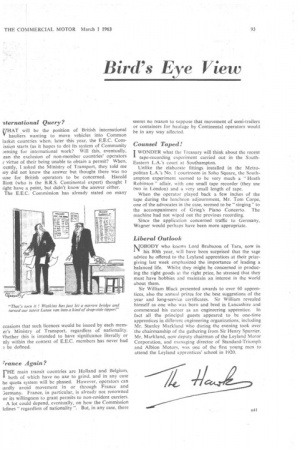Bird's Eye View
Page 95

If you've noticed an error in this article please click here to report it so we can fix it.
uernational Query?
VHAT will be the position of British international hauliers wanting to move vehicles into Common larket countries when, later this year, the E.E.C. Cornission starts (as it hopes to do) its system of Community :...ensing for international work? Will this, eventually, can the exclusion of non-member countries' operators ( virtue of their being unable to obtain a permit? When, 'cently, I asked the Ministry of Transport, they told me icy did not know the answer but thought there was no Luse for British operators to be concerned. Harold lliott (who is the B.R.S. Continental expert) thought I tight have a point, but didn't know the answer either. . The E.E.C. Commission has already stated on many
ccasions that such licences would be issued by each memer's Ministry of Transport, regardless of nationality. Vhether this is intended to have significance literally or nly within the context of E.E.C. members has never had ) be defined.
'ranee Again?
rHE main transit countries are Holland and Belgium, .1both of which have no axe to grind, and in any case he quota system will be phased. However, operators can iardly avoid movement in or through France and 3ermany. France, in particular, is already not renowned or its willingness to grant permits to non-resident carriers.
A lot could depend, eventually, on how the Commission lefines " regardless of nationality ". But, in any case, there
seems no reason to suppose that movement of semi-trailers or containers for haulage by Continental operators would be in any way affected.
Counsel Taped!
WONDER what the Treasury will think about the recent I tape-recording experiment carried out in the SouthEastern L.A.'s court at Southampton.
Unlike the elaborate fittings installed in the Metropolitan L.A.'s No. 1 courtroom in Soho Square, the Southampton experiment seemed to be very much a "Heath Robinson" affair, with one small tape recorder (they use two in London) and a very small length of tape.
When the operator played back a few inches of the tape during the luncheon adjournment, Mr. Tom Corpe, one of the advocates in the case, seemed to be "singing" to the accompaniment of Grieg's Piano Concerto. The machine had not wiped out the previous recording.
Since the application concerned traffic to Germany, Wagner would perhaps have been more appropriate.
Liberal Outlook
MOBODY who knows Lord Bra bazon of Tara, now in his 80th year, will have been surprised that the sage advice he offered to the Leyland apprentices at their prizegiving last week emphasized the importance of leading a balanced life. Whilst they might be concerned in producing the right goods at the right price, he stressed that they must have hobbies and maintain an interest in the world about them.
Sir William Black presented awards to over 60 apprentices, also the annual prizes for the best suggestions of the year and long-service certificates. Sir William revealed himself as one who was born and bred in Lancashire and commenced his career as an engineering apprentice. In fact all the principal guests appeared to be one-time apprentices in different engineering organizations, including Mr. Stanley Markland who during the evening took over the chairmanship of the gathering from Sir Henry Spurrier. Mr. Markland, now deputy chairman of the Leyland Motor Corporation, and managing director of Standard-Triumph and Albion Motors, was one of the first young men to attend the Leyland apprentices' school in 1920.
















































































































































